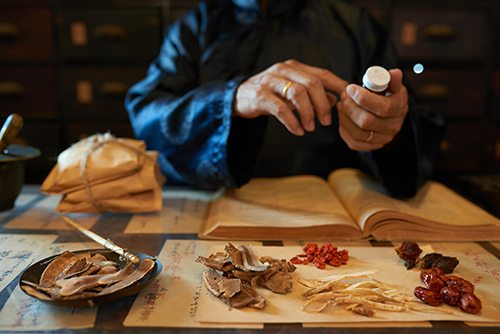One of the major challenges in the global fight against the COVID-19 pandemic has been the availability of drugs or other pharmaceuticals that can effectively target and treat the disease.
In the more than two years since the pandemic began, in addition to newly developed therapeutics, a number of existing medications have been tried and tested for their ability to act as antivirals, improve the body’s immune response, or ameliorate the severity of the disease in the treatment and management process.
Much of the focus has been on available, primarily Western, medicines, with the broad spectrum antiviral remdesivir showing most promise in treating COVID-19 in hospitalized patients.1 More recently, Pfizer’s Paxlovid and Merck’s molnupiravir have been developed and approved for use in the treatment of mainly mild-to-moderate disease in patients.2
Given current treatment dilemmas for COVID-19, modalities utilizing alternative medication have expanded, especially in countries like China where traditional Chinese medicine (TCM) has an approximate 3,000-year history of treating infectious diseases.3 In recent history, TCM has also been used for the treatment of patients during the SARS and MERS pandemics.4
Growing Usage and Acceptance of TCM Treatments
The role of TCM has grown since the pandemic began, with more research dedicated to understanding its role and use. TCM has become more widely used as part of the frontline treatment for symptoms associated with COVID-19. In April 2020, officials in China formally added three formulations (Lianhua Qingwen, Jianhua Qinggan Granule, and Xuebijing injection) to the recommended standard therapy guidelines for COVID-19.5
In late February and early March 2022, an expert panel from the World Health Organization (WHO) evaluated the evidence for TCM in the treatment of COVID-19. After a three-day meeting, the WHO panel found that early intervention with oral TCM in the mild-to-moderate stages of COVID-19 infection may lead to earlier recovery, and potentially reduces progression to more severe disease, while achieving a similar safety profile to conventional treatment. No formulation seemed to be markedly superior to others. Overall, more research is required – including larger-scale randomized controlled trials, especially in the area of injectable TCM for the treatment of severe COVID-19 disease.6
During the recent surge in omicron cases in Shanghai and Hong Kong, local governments have distributed Lianhua Qingwen medication to numerous households to help in treating mild-to-moderate cases of COVID-19 infection.7
The Foundations of TCM
When considering TCM, it is important to understand the basic theory underpinning its use. In general, TCM applies “holism,” which regards the body as an organic whole, as its guiding principle and “syndrome differentiation and treatment” as its method of diagnosis and treatment in combatting viruses. Therefore, even localized diseases can be treated effectively only by considering the whole body. The syndrome differentiation component looks to discover the location, etiology, properties, and relationship between the “zheng” (good energy) and “xie” (evil energy) of the disease, which reflect the nature of the dynamics between the pathological factors and the body’s resilience. Treatment is then offered according to the overall assessment.8
Antiviral TCMs
According to TCM theory, antiviral TCMs work in two main ways: “dispelling evil” and “fu zheng.” Dispelling evil generally refers to the direct inhibition or killing of viruses by Chinese herbs. The mechanism of action for this kind of herb is like that of direct-acting antiviral drugs in Western medicine (direct-acting antivirals). Fu zheng refers to improving the body’s physical fitness and ability to resist evil, as well as the body’s rehabilitation. This may be accomplished by supporting the body’s own immune system or reducing damaging inflammatory pathways, which are also important aspects of the antiviral mechanisms of TCMs.9
TCM’s Use Specifically for COVID-19
TCM treatments used for COVID-19 are mainly derived from plants containing active main ingredients that have chemical properties that target certain cells, receptors, or proteins in the body – similar to Western medicines. Each formulation is likely to contain a group of herbs or plant-derived ingredients that, when combined, aim to have a cumulative effect.
Some common examples of plant-derived active ingredients found in TCMs used for treatment of COVID-19 include the following:10,11
Using the TCM syndrome differentiation and treatment theory, COVID-19 falls into the “dampness-toxin-pestilence” category with four distinct severity stages of mild, moderate, severe, and critical. At each severity stage, different modalities of TCM treatment are required and different treatments may be applied. Currently, a number of recognized TCM treatments are being used.
The list below highlights the formulations in more widespread use.12
The medications indicated for observational, mild, or moderate disease states have been shown to provide benefits when used alone. The medications for serious or critical states are usually used in conjunction with conventional treatment modalities. The medications listed as injections are better used in the severe or critical syndrome phases as they are not dependent on the oral route, have more predictable bioavailability, and consist of cleaner ingredients.
Safety First
As with any medication or treatment, proper and prudent usage is advised. TCMs should not be taken without the presence of symptoms, and usage needs to be monitored by TCM doctors. People with underlying health conditions need to be aware of the dangers of self-administration without proper monitoring by health practitioners. Unsupervised use can be hazardous as some patients may experience serious side effects.
Experts recommend that oral formulations, such as Lianhua Qingwen and Jinhua Qinggan, should be taken for no longer than two weeks. Prolonged intake can lead to depletion of the body’s inner balance and even possible organ damage. In Hong Kong, cases of excessive intake of Lianhua Qingwen have caused liver failure in patients with underlying chronic liver disease such as that caused by Hepatitis B13.
Another major risk of prolonged self-administration of TCM is the masking of severity of COVID-19 and symptom suppression, leading to delays in seeking appropriate medical attention. In many reported cases, delayed presentation to hospitals as a result of TCM self-medication has resulted in more critical conditions at presentation.
Looking Forward: Promising Outlook, but Further Research Required
For the fight against COVID-19 and the need for effective treatments of the disease, TCM shows promise. From the limited studies available, TCM shows potential as an effective way to treat COVID-19 symptoms in mild and moderate disease. For severe disease, the combination of TCM with Western medicine and supportive interventions also appears to reduce symptoms and disease progression in some studies.14
However, debate surrounds whether the agents act as true antivirals that specifically treat COVID-19. Therefore, in countries such as the U.S. and Singapore, TCM medications such as Lianhua Qinwen are not registered to treat COVID-19, but rather have been categorized into the same category as cold and flu medication purely for symptomatic relief. Further research is required to fully ascertain the true role of these medications and their pharmaceutical action.
Potential new areas of further research include the effect of TCM on the longer-term symptoms experienced by patients after COVID-19 infection, or “long COVID,” where preliminary research suggests TCM may be beneficial in alleviating some of the effects.
Thus, while current clinical evidence supports limited use of TCM either on its own or in combination with other therapeutics, further large-scale clinical research is still required to fully understand the true nature of TCM and its role in the treatment of COVID-19.



